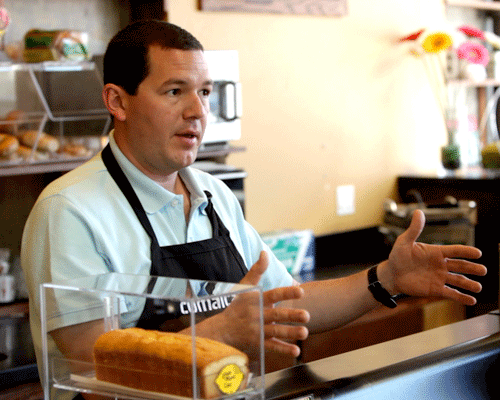
When Roberto Guerrero and his family emigrated from war-torn Nicaragua in the 1980s, they hoped to share their family’s love of coffee with the residents of San Francisco. Starting with one store in 1987, members of the family opened several coffee shops in the Bay Area, including two Cumaica Coffee stores owned by Guerrero.
Guerrero loves the city of San Francisco and its coffee-loving residents. “San Francisco has been very generous,” he said. “It’s where the doors of opportunity are opened,” he adds. Unfortunately, California’s version of the Americans with Disabilities Act (ADA) has created opportunity for plaintiffs’ lawyers to target small businesses like Guerrero’s.
It began when Guerrero received a letter from a customer who claimed that certain features in Guerrero’s store violated the ADA. All were minor violations such as a recycling bin placed too close to a door and a pastry case located too close to a counter. Guerrero did not realize his store was in violation of the ADA but quickly made the requested changes and notified the customer.
The customer acknowledged that Guerrero made the requested changes yet sued anyway and sought nearly $90,000 in damages. Guerrero was shocked by the lawsuit and even invited the plaintiff and his attorney to see that the violations were corrected. The plaintiffs’ lawyer conceded that Guerrero’s store was in compliance, but said it was too late to avoid the lawsuit. After about a year of litigation, Guerrero settled the lawsuit for $20,000.
“Twenty thousand dollars is a lot of money and having it taken away by a crook, it hurts,” he says. “I would have rather given it away to charity.”
“That money can be the difference in hiring a new person or giving wage increases to their employees,” says Bryan Quigley, Senior Vice President, Strategic Communications for the U.S. Chamber Institute for Legal Reform (ILR).
Quigley says that business owners realize that it will cost them a lot of money to defend the lawsuit so they agree to settle, which is what the plaintiffs want. “It’s like extortion,” he says.
Guerrero felt trapped in the same way. “They come into your store and intimidate you and they make your life miserable, so after a few months you feel that you will pay whatever to get them out of your life.”
Guerrero’s wasn’t the only small business owner targeted by such lawsuit abuse, which is more common than most people think. At least sixteen neighboring businesses were also sued by the same plaintiff. “Two business owners I know had to close their businesses because they could not pay to settle their lawsuit,” says Guerrero.
“It’s something that needs to be stopped - everyone loses because of these frivolous lawsuits,” says Guerrero, who points to the lost jobs, consumer services, and tax revenue. “They hurt the entire community.”
According to Quigley, these stories of lawsuit abuse are all too typical for small business owners, an increasing number of whom are Latino Americans. In fact, U.S. Census figures show that Latino Americans are creating small businesses at a rate three times higher than the rate for the non-Latino population.
To reach out to this growing community, ILR has created a new Spanish language version of its Faces of Lawsuit Abuse website (www.abusosdedemandas.org). The English site is at: www.facesoflawsuitabuse.org
Guerrero and Quigley share a mission of increasing awareness among business owners of these frivolous lawsuits. They believe that the more business owners know, the less likely they will be sued.
“We are trying to build broad awareness that a lawsuit coming against your business is not necessarily an isolated incident,” says Quigley, who has seen how some lawyers target all businesses on the same block.
“Be aware that these people can come in and look for small violations that you may not be aware of - violations that are easy to fix.”
“Business owners need to be aware of what is happening and need to have the knowledge of how to protect themselves,” says Guerrero, who references a new certification that protects business owners from such lawsuits.
“You have to hire an expert who tells you what’s wrong and will give you a certificate if everything is OK,” he says. “If a lawsuit is brought against you it will be dropped if you correct the violation within ninety days.”
“We believe that small businesses are the backbone of a growing economy,” adds Quigley. “We need more jobs, not more lawsuits.”
